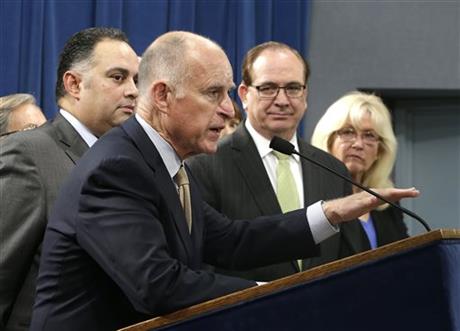
By DON THOMPSON
Gov. Jerry Brown, center, discusses a proposal to reduce California’s prison population, at a Capitol news conference in Sacramento, Calif., Tuesday, Aug. 27, 2013. In response to a federal court order to reduce the state’s prison population, Brown announced a $315 million plan to send thousands of inmates to private prisons and to empty county jail cells to avoid what he and his supporters say would be a mass release of dangerous felons. Brown was joined by legislative leaders, Assembly Speaker John Perez, D-Los Angeles, left, Senate Minority Leader Bob Huff, of Diamond Bar, second right, and Assembly Minority Leader Connie Conway, of Tulare, right. (AP Photo/Rich Pedroncelli)
SACRAMENTO, Calif. (AP) — Gov. Jerry Brown on Tuesday responded to a federal court order to significantly reduce California’s prison population by proposing a $315 million plan to send thousands of inmates to private prisons and vacant county jail cells, hoping to avoid what he said would be a mass release of dangerous felons.
The cost could reach $700 million over two years, with much of the money likely to come from a $1.1 billion reserve fund in the state budget.
During a news conference at the Capitol, Brown bristled at the court’s suggestion that the state could continue its early release of certain inmates to meet the federal judges’ population cap. He noted that California has already released some 46,000 inmates to comply with the court’s orders and said only the most dangerous convicts remain in state prison.
The judges have ordered the state to release an additional 9,600 inmates by the end of the year.
Brown, however, said sending them to available cells in privately run prisons within California and in other states, as well as to empty jail cells, is the best way to meet the court’s mandate without endangering public safety.
“Public safety is the priority, and we’ll take care of it,” the governor said. “The money is there.”
The plan will now head to an uncertain fate in the Legislature, where the two Democratic leaders are at odds.
Assembly Speaker John Perez was joined by the Republican leaders of both houses at the governor’s news conference. Perez, a Democrat, said he expected lawmakers to approve the governor’s plan — or something close to it — before this year’s session ends in mid-September.
But approval is far from certain because of opposition from state Senate President Pro Tem Darrell Steinberg, D-Sacramento. He was noticeably absent from Brown’s news conference but issued a statement saying the plan had “no promise and no hope.”
He said continuing to pour money into additional space for prison inmates was not a long-term solution.
“As the population of California grows, it’s only a short matter of time until new prison cells overflow and the court demands mass releases again,” Steinberg said in his statement.
He was not immediately available to elaborate but will offer his own proposal on Wednesday to comply with the court order.
One of Steinberg’s chief lieutenants, Democratic state Sen. Mark Leno of San Francisco, said California should create a sentencing commission that would consider reducing prison sentences for some crimes as a way to ease prison crowding in the long run.
Temporarily renting more cells “doesn’t solve the problem,” Leno said. “What’s the long-range solution here? Otherwise, we’re going to find ourselves in the same situation over and over and over again.”
If the Legislature fails to act, federal judges have said they have the authority to override state law and order the early releases.
Brown’s plan is the latest development in a long-running legal battle over how to improve the medical and mental health treatment of California prison inmates. The federal courts have ruled that previous care was so poor that it failed to meet the constitutional protections against cruel and unusual punishment.
Over the past decade, the state has gone on a spending spree to build new prison medical and mental health facilities, while boosting its medical staff and offering salaries to health care professionals that can range between $200,000 and $400,000 a year, with many of them making even more money.
Brown said the state has spent billions of dollars to satisfy the judges’ demands.
“This gives us some breathing room so that we can demonstrate to the courts that our health care and our mental health care meet constitutional muster,” he said of the plan unveiled Tuesday.
During his news conference, Brown was joined by some of the leading law enforcement groups in the state. Associations representing district attorneys, county sheriffs, probation officers, police chiefs, rank-and-file officers and crime victims spoke in favor of his proposal.
Before Tuesday, Brown’s most significant step to address the court order was his realignment of the state’s criminal justice system. That landmark change, which took effect in October 2011, sentenced non-violent, non-serious and non-sexual criminal offenders to county jails instead of state prison.
California’s 58 counties have been under special pressure since realignment became law, with sheriffs managing growing jail populations with longer-term and more serious inmates than they are used to. At the same time, county probation officers have greatly increased caseloads as they handle ex-cons who used to be supervised by state parole agents.
Realignment has helped the state reduce its prison population by more than 46,000 inmates since 2006, but the federal judges want more. They have said the inmate population in the state’s 33 adult prisons must be lowered to 110,000 by the end of the year.
Brown’s proposal would avoid early parole for sick and elderly inmates along with early release of more dangerous offenders. It includes leasing excess jail cells from Alameda and Los Angeles counties, and renting an entire 2,300-bed private prison in Kern County from Corrections Corp. of America and staffing it with guards employed by the state.
The law enforcement representatives who attended Tuesday’s news conference said they support the governor’s plan because they are worried about additional felons being given early release.



